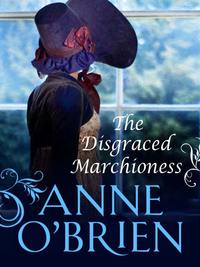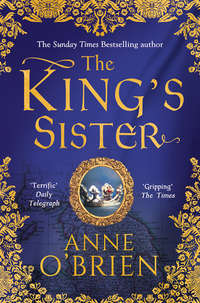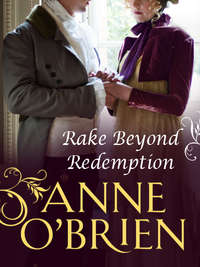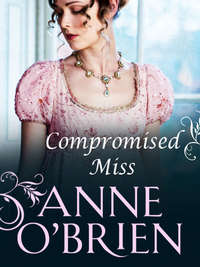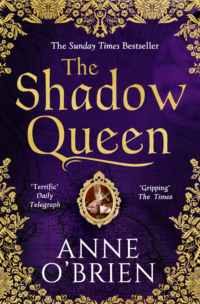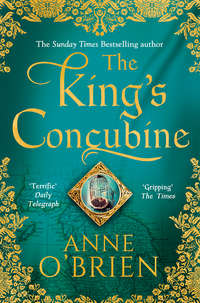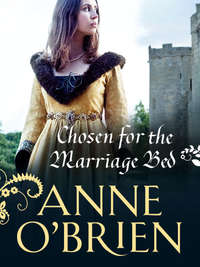
Полная версия
The Uncrowned Queen

About the Author
ANNE O’BRIEN taught History in the East Riding of Yorkshire before deciding to fulfil an ambition to write historical fiction. She now lives in an eighteenth century timbered cottage with her husband in the Welsh Marches, a wild, beautiful place renowned for its black and white timbered houses, ruined castles and priories and magnificent churches. Steeped in history, famous people and bloody deeds, as well as ghosts and folklore, the Marches provide inspiration for her interest in medieval England.
Visit her at www.anneobrienbooks.com
Also by Anne O’Brien
Virgin Widow
Devil’s Consort
The Uncrowned Queen
(short story prequel to The King’s Concubine)
The King’s Concubine
The Uncrowned Queen
Anne O’Brien

Table of Contents
Cover
About the Author
Title Page
PROLOGUE
CHAPTER ONE
CHAPTER TWO
CHAPTER THREE
CHAPTER FOUR
CHAPTER FIVE
Extract
Copyright
PROLOGUE
February 1330
‘I’ll not allow this – this travesty – of a ceremonial to keep you on your feet in these damnable conditions any longer,’ Edward muttered in my ear as we stood in the nave of Westminster Abbey, waiting for the procession to begin. It was a cold February, and our breath billowed in clouds in the freezing air.
I smile wanly – even my smile was frozen. At least the building was complete, and the roof did not leak even if the lively draughts around my ankles were enough to ruffle my skirts. When I had wed Edward two years ago in York – in an equally bone-freezing January – we had all had to sidestep the puddles and the drops of water showering down from overhead as we walked down the aisle. It had all been a thoroughly shabby affair for the marriage of the English king to a daughter of Hainault. It seemed to be my destiny to experience the greatest moments of my life in the worst of circumstances.
‘We’ve been waiting on Isabella’s appearance for half an hour …’ Edward observed.
‘And hour at least,’ I amended, equally low-voiced. My feet, like blocks of ice in my thin shoes, had registered every minute of the Dowager Queen’s tardiness. Edward’s mother played by her own rules. ‘If these clerics don’t hurry I expect I’ll give birth to your first-born on the steps of the high altar. And then what would your lady mother have to say? Her dignity would be irrevocably besmirched.’
I was beyond caring what I said, beyond weary, having struggled into the second change of clothing of the day, discarding the green velvet and miniver for a less-than-warm red and grey samite tunic and mantle. The sable edgings barely stretched to meet over my belly. I was not carrying this child well, feeling clumsy and overwrought. I could see my new gilded shoes only if I leaned forwards.
‘I didn’t mean that!’ For a moment Edward looked startled, then amused, and finally, frowning at my levity, downright forbidding. I enjoyed the range of emotions that chased across his features. It proved he still managed to retain his sense of humour, no matter the weight of adversity on his damask-slick shoulders. I discovered the energy to admire those shoulders, albeit fleetingly: today he looked every inch the King he was. But then his gaze, glittering with suppressed anger, slid away from me. ‘Look at them,’ he growled. ‘Every last one of them plotting to undermine my power. My authority. Kent and Mortimer are like fighting cocks, squaring up to do battle to win the spoils. I can just about tolerate Kent. At least he is my father’s brother and has royal blood in his veins. I swear there’s nothing but venom in Mortimer’s.’
I looked as he indicated with a lift of his chin. Dowager Queen Isabella, now arrived to honour me with her appearance at my coronation, was wrapped about in cloth of gold and ermine, relishing her superiority and entirely indifferent to my sufferings. I was a bride whose dowry and Hainault connections were of more value than my person. I had been part of Isabella’s strategy to raise an army, oust her husband from his throne and take control. Military aid had come as part of the deal. And how spectacularly successful Isabella had been, for herself and her damnably ambitious lover, Lord Mortimer.
Mortimer was smiling with insincere charm like the rogue he was, eyes as cold as the stone paving. Edward’s uncle, the Earl of Kent, scowled indiscriminately on the whole performance. Tension was high and the rank odour of imminent civil war tainted the incense-filled air. Edward could have sliced through the vicious atmosphere with no effort and a blunt broadsword.
‘Do you remember the advice you gave me?’ Edward suddenly asked, as the blast of a fanfare to herald the beginning of the procession all but deafened us. We shuffled slowly into line.
‘I do,’ I said. I rested my hand lightly on Edward’s arm, anticipating the moment when he would present me to his subjects as their Queen. ‘As I recall, I gave you a particularly hard time.’
‘And I expect I deserved it.’ A fleeting grin curved his mouth, quickly vanishing so that he looked older than his years. ‘Well, my percipient wife, the time is come for change. First we’ll get you crowned …’ He covered my hand with his, peering down into my face. ‘Can you tolerate it?’
‘Of course.’ Were not daughters of Hainault made of stern stuff? And the brush of Edward’s fingertips over my chilly skin had warmed my blood. I might be a strategic bride, and less outwardly appealing than my sisters, but that did not mean that Edward did not love me.
‘I’m not convinced,’ Edward frowned. ‘I see shadows under your eyes deep enough to bury Mortimer in.’
Behind us, Mortimer gave the order for the procession to begin. I took a breath and steeled myself for the lengthy but necessary formalities. Since I was so obviously carrying Edward’s child, I presumed that it was essential that my crowning be as formal and magnificent as it was possible to make it.
‘Wait!’
It was Edward’s command, to my surprise. Mortimer stepped out of the procession to see what was amiss. He was not pleased. Nor was Isabella, whose pre-eminence was suddenly compromised.
It gave me a little jolt of pleasure. Unworthy, perhaps, but quite understandable.
Edward raised his hand to beckon Mortimer’s newly appointed Archbishop of Canterbury who had been lurking uneasily on the edge of the milling courtiers. The priest, resplendent in mitre and full regalia, approached and bowed.
‘I want this done fast,’ Edward stated without preamble.
There was a pregnant silence.
‘Her Majesty should be crowned with all due process, Sire,’ Archbishop Meopham reproved, glancing over to where Mortimer, arms folded across his chest, was keeping a jaundiced eye on the proceedings.
‘Her Majesty should have been crowned two years ago,’ Edward retorted. ‘Now her health is under strain.’
The Archbishop lowered his voice. ‘But the Lord Mortimer wishes the full ceremony, Sire, to honour the Lady.’
More like to honour Mortimer! I could see the thought dance in Edward’s eyes as he stared at the Archbishop, but not a word of it passed his lips. This was neither the time nor the place for so formidable a level of confrontation. ‘My wife will be honoured when the holy oil touches her brow,’ Edward stated. ‘The length of the ceremony is irrelevant. I wish it to be cut short.’
‘But, Sire …’ The cleric cast another furtive glance towards Lord Mortimer.
And at last the edge of temper rumbled. ‘I am your liege lord, Meopham. If you are wise, if you have an eye to your future in this kingdom, you will obey me. Affairs will not always be as they are today. The humiliations of the past can be tolerated no longer. Do you understand me?’
The Archbishop, pierced by Edward’s stare, understood all too well, the warning and the promise. He swallowed hard and bowed.
‘Yes, Sire. Indeed I do. It will be as you desire.’
And so it was. It must have been the fastest coronation in history. Mortimer glowered, Isabella plucked irritably at her ermine, Kent stood throughout with his hand on his sword-hilt, but I was duly anointed, crowned and feasted almost before I could change my garments yet again for cloth of gold and a miniver cloak. And as the crown was placed on my head, I knew. Here, in this one small wielding of royal power, in this oblique statement of future intent, was my first real intimation of the King who would emerge from the shadow of the furious, frustrated young man who had come to Hainault three years before to wed my lovely elder sister, and who had got me instead.
CHAPTER ONE
My coronation complete to everyone’s satisfaction, I managed the briefest of celebratory tours so that the people of Windsor, Guildford and Winchester might see their new and bourgeoning Queen, before Edward insisted that it was time I was restored to the peace of Woodstock. Isabella was not sorry. It would mean less financial outlay on my behalf. Mortimer had his thoughts turned to a persistent rumour that Kent was massing an army of mercenaries to challenge him for power. And Edward? Edward was merely caught in a snare between the two, struggling to keep a foothold in a morass of treason and counter-treason. As for my own thoughts, I was not reluctant to return to Woodstock – days spent in the self-absorbed company of Isabella and Mortimer were wearing – except that my time with Edward was now drawing to a close. Edward would leave me to return to Westminster with Mortimer, and I would take to my chamber to await the birth of my first child.
Our arrival at the gracious old palace of Woodstock proved to be an edgy occasion.
‘I have a pressing need of money,’ I said to Edward, keeping a firm hold of his sleeve as soon as he had helped me to alight from my well-cushioned litter. Queen Isabella was already summoning him to follow her, to give his royal assent to any number of charters that would bring gold into the royal coffers – none of it, unfortunately, to be spent on me. ‘I need it desperately, unless you want your new Queen to be even deeper in debt that she is already.’
My ankles were swollen, my eyes heavy from lack of sleep, making me unusually irritable. I did not wish to part from Edward with dissension between us, but as I saw it I had no choice. I could barely scrape together two silver pennies.
‘It’s bad, is it?’ His eyes were sharp on my face, reading there all that I could not say in public, his hand supportive beneath my arm.
‘I may be God’s recently anointed,’ I pointed out, rather waspishly, ‘but I am in effect no better than a beggar in the gutter. My servants stay with me out of loyalty only.’ It was difficult to hide my bitterness.
Edward nodded. He understood all too well. Of course he did. The humiliations of the past can be tolerated no longer, he had said in the Abbey. How clear the humiliations, the constant degradation that dragged us both down, had become to me since I had arrived in this unhappy, tension-ridden kingdom. I lived under Isabella’s control with no household of my own, my dower fallen into her hands so that I had no money for my own needs. Reluctant to release power or status, she had resisted my crowning until my advanced pregnancy became an embarrassment. An heir born and the Queen not even crowned? I detested the constraints, the sweeping aside of my consequence, but for Edward, the lawfully anointed King, it had been so much worse. He had been King now for three years, since his father’s reported death in Berkeley castle, but the grip on England’s crown and throne was as much Mortimer’s as it had ever been. It was Mortimer who decided that Edward must abandon English powers in Scotland. It was Mortimer who discussed English policy of war in France. It was Mortimer who dispensed patronage and earldoms with open-handed generosity to those loyal to him, while Edward was kept chained and impotent, without the means to retaliate.
Some days my heart bled for him. The day he was forced to put his hand to the shameful peace with Scotland, at Mortimer’s insistence, and so lose a part of his inheritance, was a black day indeed. Edward did it, his face engraved in stone. Only I knew the cry for vengeance deep in his soul.
Did Edward never speak out against such illegal appropriation of royal power? Did he never demand his rightful position? Oh, he did – but who was there to hear? Mortimer had England’s money and England’s army in his thrall. Who was there to fight for Edward, when those who did not actively support Mortimer still feared him as they feared the Devil himself?
‘I don’t have the money to pay my servants,’ I hissed, ‘and …’
‘… and Isabella, of course, will not give you any,’ Edward completed my accusation.
I raised my brows in reply. In the terms of my marriage, Isabella had promised to provide me with an appropriate dowry, assigning to me lands and rents from her own dower worth three thousand pounds. I had never seen one gold coin of it. The land and the income remained firmly in Isabella’s hands and I lived on her charity when she saw fit to dispense it.
‘Come with me,’ Edward took my hand in his. ‘You can put your case and I’ll support it. I’m sorry.’ He hid his outrage well as he raised my fingers to his lips in a neat little gesture of affection. ‘It’s the best I can do.’
We followed Isabella into her accommodations. I tried not to resent their magnificence, the colossal amounts that had been spent on tapestries and furnishings and gleaming furniture. It was truly a room fit for a Queen. My own inadequate chambers paled into insignificance, making my lack even more painful. And there in the centre, a rare gem in a gleaming setting, a coffer open before her, was Dowager Queen Isabella. What a remarkably handsome woman she was, as finely carved and without blemish as one of our priceless ivory statues in Hainault. Her hair was silver fair, her skin finely textured and, looking up as we entered, she spoke in a cold, diamond-clear voice.
‘There is no need for your wife to be present, Edward. All I need is your signature.’
‘She does need to be here,’ Edward replied. ‘Philippa needs money, madam.’
‘I expect she does.’
Isabella looked me up and down from my dusty veil and crispinette – neither in the first rank of fashion – to my disappearing waistline. She rarely looked at me. To do her justice, she did not actively dislike me. She did not treat me with any degree of cruelty, unless neglect in itself be a form of cruelty. She simply ignored me, a thing of no importance now that my hand in marriage had brought the wherewithal to enable her to wrest the crown from her husband, the old king. I was no longer useful except to breed and provide a future heir. I had simply to fend for myself.
‘Tell my mother what you lack, Philippa,’ Edward ordered, his hand firm around mine.
I needed no second invitation, although I was not hopeful. ‘It is for my birthing chambers, my lady’ I said baldly.
I should have had a splendid suite of rooms already prepared for me, where I would stay for the birth of my child and for the requisite month afterwards until I was churched, cushioned from the rest of the world in the full panoply of royal luxury. There I should, by tradition, be welcomed with wine and spices, music and celebration, all in anticipation of the coming event. As it was, I would be lucky to pay for bread and small beer and a single lute player.
‘What do you need?’ Isabella was already preoccupied in opening a large sealed document, perusing its contents.
‘I need money to pay those who will care for my baby. Martha who will rock the child’s crib. Joan who I have employed as a wet nurse. My valet Thomas who will fetch and carry to my door,’
‘Very well. Is that all?’ Isabella almost yawned.
‘No. There is Lady Katherine Haryington too, my lady, my own particular lady-in-waiting.’
‘They will all be provided for, of course …’
‘I need clothes for myself and for my servants,’ I continued, determined to itemise every possible need before my soft incarceration. ‘I need tapestries and bed covers. Bed linen and pillows …’
‘I’m sure we can find some unused hangings here in the palace.’ Isabella showed her teeth in a smile. It held no warmth.
‘I am most grateful, my lady.’ Well they would be better than nothing when the dust and moth had been beaten out of them. I nearly said as much but felt Edward’s hand squeeze harder, and so forced my tone to remain flat. ‘I need money to pay for the food we will need for the months of my confinement.’
‘I will not let you starve to death, Philippa.’ Brows raised in elegant ennui, Isabella picked up a pen. ‘Now, if that is all, I wish you to put your signature to this, Edward, before you leave …’
I sighed silently, but Edward’s voice was as cold and clear as his mother’s
‘Not yet. This matter must be settled, madam. You must supply my wife with what she needs. It is not fitting that she should have to beg. Nor must she have any worries about this.’ He glanced down at me then back to his mother. ‘She should have at least two of the manors that were promised to her for her dower.’
Isabella continued to read the terms of the document.
‘Philippa,’ Edward reiterated with an insistence that forced me to hide a smile, ‘should have Pontefract and Knaresborough for her own.’
It crossed my mind that she might still refuse outright, but Isabella shrugged gracefully as she at last looked up. ‘Very well. I will sign them over to her. They raise little in revenue, and are inconveniently far to the north, but you are welcome to them, dear Philippa.’
I pinned a grateful smile to my lips. I should have had them two years ago. I recognised them as part of the promised dower.
‘Excellent.’ Edward remarked. He escorted me to the door.
‘She won’t do it,’ I whispered, under cover of him bending to salute my cheek.
‘I know …’
‘Edward …!’ Isabella’s demand floated after us.
Edward’s face became a bland mask. He kissed my cheek again, opened the door for me and returned to put his royal seal on the documents of his mother’s choosing.
There was one blessing from that unpleasant little interview.
‘Will you remain at Woodstock during Philippa’s confinement?’ Edward had asked.
‘No,’ Isabella had replied.
She did not explain. I knew she would be wherever her lover Mortimer was. And I heaved a sigh of relief. Sometimes neglect could be a blessing.
CHAPTER TWO
Edward was able to spend one night with me at Woodstock before his escort was instructed to sweep him up and deposit him back under Mortimer’s beady eye at Westminster. It was no time for passion. Edward was restless and preoccupied with something he was not telling me, and I was too furious with Isabella to put aside my grievances and actually ask him what it was. But my mood improved when Edward rubbed my ankles, then held me in his arms and told me how much he loved me. With my head comfortably resting in the little hollow below his shoulder, I continued to be astonished, for I of all the four Hainault daughters, was the least blessed with physical beauty. The family features were strong in all of us, but they had not done their best by me. I had square, practical hands, a broad forehead, wide cheeks and lank hair of pale mouse. The sallow skin that glowed after a sunny day on Margaret and Jeanne and baby Isabelle looked merely dull on me. Nor was I very tall, even for my age. Jeanne and Isabelle, younger than I, would soon outgrow me. I was, my mother the Countess of Hainault frequently observed, a plain and wholesome daughter. Jeanne, in moments of sisterly bile, labelled me a poor dab of a girl. Isabella had wanted the Hainault dowry and did not care which sister became the bride, but Edward had wanted me.
I held on to that one miraculous thought when fears rained down on me thick and fast. For now, sheltered in his arms, I was content.
‘I’m afraid you’ll not see Pontefract or Knaresborough,’ he murmured, his chin resting on my head, as I sighed deeply.
‘No, I don’t suppose I shall.’ I laughed a little. ‘I didn’t expect to be scrabbling for money as Queen of England. But still …’ I paused for a moment, merely to tease. ‘… on the whole, I’m pleased I wed you.’
‘Only pleased?’
I raised my head so that our eyes met, barely a handspan apart, and as we smiled at each other I recalled my first sight of him, striding into the audience chamber at Valenciennes in the wake of Isabella. How astonishingly handsome he had been, this Plantagenet prince, striding confidently forward with a proud tilt of his head and a spine as straight as a pikestaff. His skin was fair, his eyes blue and his luxuriant hair as gold as a corn sheaf. He was to me as breathtaking as the image of the warrior angel St Michael in the window of our private chapel. And he still was.
‘I thought Isabella would choose Jeanne for you,’ I confessed, pushing back the fall of hair that invariably got in his eyes. I was feeling in a mood for confession and intimacy.
‘She did,’ Edward admitted dryly, ‘since Margaret was already wed. But how could I refuse a girl who was kind and resourceful – a girl who was bold enough to accuse me of being stupid when I informed her that to my mind it was impossible to trust anyone, particularly servants.’
I laughed at the memory. ‘You were impossibly opinionated. I was surprised that Walter did not hit you.’ Walter Manny, my page – now a squire and come with me to England – was unquestionably loyal to me and to those of my choosing.
‘So was I. I deserved it, I expect. My pride knew no bounds.’
Allowing my head to sink back against his chest, I sighed again, remembering. It had been a dire story that Edward had eventually told after much persuasion.
‘How can I be expected to trust anyone?’ he had demanded furiously when I had accused him of rank insensitivity to me and to Walter. ‘I am spied on. Every minute, every day. Everything I say or do is reported back to the Queen or Mortimer. If I write a letter, it is intercepted and read. I am not allowed my own friends. My servants are not my appointment. I am burdened with a bodyguard in my mother’s pay. I swear everything I eat and drink is reported to my mother. It’s worse than being in a prison cell.’
It had chilled my blood. From a position of privilege, a childhood where I had been given love and freedom and no more restriction than was thought good for a daughter of Valois and Hainault, I could not imagine such shackles. As for every word I spoke being reported to the Count or Countess: even my governess showed more tolerance than that, and accepted my childish misdemeanours. It must, for Edward, have been an intensely lonely existence.
‘You taught me to trust, and to have faith in my own destiny,’ Edward mused now, interrupting my reverie, his own thoughts obviously far away. ‘I never met anyone with so many opinions. Or so much advice to give.’


